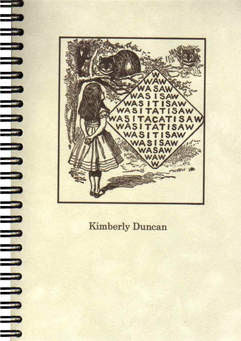MATHEMATICS BEHIND THE MADNESS OF THE CAT
AND ALICE by Dr Khin Maung Win (Maths)
(http://www.specialbindings.com/aliceinwonderlandjournal.htm)
The following passage is from Lewis Carrol’s ‘Alice in Wonderland’.
The cat said ,”We’re all mad here.I’m mad.You are mad.’
”How do you know that I’m mad ?” asked Alice.
”You must be or you wouldn’t have come here.”
Alice didn’t think that proved it at all .However she went on.
”And how do you know that you’re mad ?”
”To begin with,a dog’s not mad.You grant that?”
”I suppose so.”
”Well then,you see a dog growls when it’s angry and wags its tail when it’s pleased.
Now,I growl when I’m pleased and wag my tail when I’m angry.Therefore I’m mad.”
Now,I growl when I’m pleased and wag my tail when I’m angry.Therefore I’m mad.”
In order to give a mathematical interpretation of the conversation,
I shall have to recall some of the laws of Logic which will be used.
They are as follows .::
I shall have to recall some of the laws of Logic which will be used.
They are as follows .::
(1) .All statements are either true or false but never both at
the same time.
. (2 )If a statement is not true,it is false.
. (3)If a statement is not false, it is true.
. (4) If two statements are joined by a conjunction ‘and’ ,then
the joined statement is true when both of the individual statements are true,
and false when at least one of them is false.
and false when at least one of them is false.
(5) .If two statements are joined by a conjunction ‘or’ , the joined statement is true when
at least one of the individual statements is true ,and false when both the individual statements are false.
at least one of the individual statements is true ,and false when both the individual statements are false.
Suppose A and B are two statements.Let ‘A or B ‘ be the joined statement of A and B. Suppose that ‘A or B ‘ is true.Then if A is false,then B has to be true and if B is false , then A has to be true.
In other words, ‘if A is not true,B must be true and if B is not true, A must be true.
In the conversation between the cat and Alice,the last law or formula of Logic has beeen used by the cat to prove that Alice is mad,although Alice herself does not accept it.
To be able to give a mathematical interpretation,we shall
re -write the main points of the conversation as follows.:
Cat . I’m mad.You’re mad.
Alice . How do you know that I’m mad ?
Cat . You must be or you wouldn’t come here.
There are two statements namely , ‘The cat is mad.’ and
‘Alice is mad .’ The reason for ‘ Alice is mad’ is given by
‘You must be or you wouldn’t come here.’ Re writing it mathematiclly it becomes two statements joined by ‘or’ in the following way .
‘Alice is mad or Alice does not come here. ‘
According to the laws of Logic,it means that
If the statement ‘Alice does not come here ‘ is false, then the statement ‘Alice is mad ‘must me true. ‘Alice does not come here ‘ is false means that ‘Alice comes here ‘ .
Thus it means that ‘If Alice comes here,Alice is mad.’ But Alice didn’t think that proved it at all.It means that Alice does not accept it as the proof.It is for the reader to
decide whether to accept it as the proof or not. Whether to accept or not ,
boils down to whether to accept this statement to be true or not .’If someone comes here ,
then he or she is mad.’ Alice does not aaccept it as true.. Do you ?
boils down to whether to accept this statement to be true or not .’If someone comes here ,
then he or she is mad.’ Alice does not aaccept it as true.. Do you ?
Next,let us cconsider the reasons behind the statement ‘The cat is mad.’
The conversation may be re written mathematically as follows.
A dog is not mad.
If the dog is angry , then the dog growls.
If the dog is pleased, then the dog wags its tail.
If the cat is pleased,then the cat growls.
If the cat is angry, then the cat wags its tail.
According to the given laws of Logic, there is no connection between madness, being angry ,being pleased, growling and wagging one’s tail.
So there is no valid reason ,according to the given laws of Logic,for the
cat’s madness.
We have shown how we may analyse the conversation mathematically.

